Using words, not swords: The black experience of white privilege

**The Edvocate is pleased to publish guest posts as way to fuel important conversations surrounding P-20 education in America. The opinions contained within guest posts are those of the authors and do not necessarily reflect the official opinion of The Edvocate or Dr. Matthew Lynch.**
A guest post by Ginger McCarty
More than 100 racially diverse students gathered on Thursday, Nov. 12. at the Garrett Hall bus stop near the amphitheater, summoned by – among other invitations – the Tab, marketed as “a Cambridge University’s Online Tabloid,” launched in 2009, with a local reach initially, and after a few years (still only online) into college and university communities in the UK (now up to 45 of them) and now into college and University communities in the U.S.
Located in some – not yet all of the original colonies along the east coast of North America: New Hampshire, Massachusetts, Connecticut, Rhode Island, New York, New Jersey, Pennsylvania, Maryland, Virginia, North Carolina, Delaware, South Carolina and Georgia (these last three are not yet represented), who gained independence as a new nation, nearly 240 years ago, when Thomas Jefferson was 33 years old, in 1776 .
There are occasional issues devoted to print publications of The Tab, traditionally twice annually, and categorically irreverent, if not strategically disruptive, perhaps similar in tone to a publication such as the Onion, in the U.S.
Officially sponsored by the Black Student Alliance and the University Chapter of the NAACP, though, the gathering on Thursday was called in order to demonstrate solidarity with students at Yale, the University of Missouri and anonymous threats on Wednesday night, evidently, at Howard University.
Writing in the Washington Post on Thursday morning, Susan Svriuga explains:
An anonymous threat to Howard University circulated on social media Wednesday night, with the author saying that anyone on the historically black university’s campus after 10 a.m. Thursday would “be the first to go” and closing with: “After all, it’s not murder if they’re black. …”
“I left MU yesterday because I couldn’t put up with it anymore,” the message continues, but expresses frustration about seeing the same issues in Maryland, alleging that black people are causing trouble everywhere. “Turn on the news and it’s always the [racial slur deleted] causing trouble everywhere.
“So I’ve decided. Any [n-word] left at Howard University after 10 tomorrow will be the first to go.” Any that try to escape on the Metro will regret that, the message continues. “I’ll go out a hero knowing I made the world better. I just hope at least someone else can see it too and continue the fight…” “After all, it’s not murder if they’re black.”
Although there seems to have been no indication that this threat was ‘credible,’ the message itself is quite is troubling – whether it was written, as we are invited to believe, by a University of Missouri student, or whether it was written by someone whose purpose is to disrupt by intention, as a contrivance to be put to good effect, whether black or white. Desperate times – as some may well believe – will call for desperate measures.
During the gathering on Thursday, following a song and before inviting students to share their thoughts and experiences there was a recitation of the poem, “If We Must Die” by Claude McKay (1889-1948). A Jamaican-American author, he was a key figure in the Harlem Renaissance of the 1920s, fans of Boardwalk Empire may recall that in season three Lester White recommends McKay’s work to his sister Maybelle White, and offers to lend her his copy of “Spaghetti and Coffee.”
Like Malcolm X, McKay was an advocate of self-determination, believing that African-Americans could do well in becoming self-reliant. In his view, that was the path to being truly free no matter what one’s circumstances entailed, whether black or while. The collection of McKay’s work,s entitled Harlem Shadows: The Poems of Claude McKay, was first released in 1922. It is available here, online. The Autobiography of Malcolm X is also available online, here, as an offering of the National Humanities Center.
The scrupulously-verified book on which the prize-winning HBO series, is based – which features brilliant portrayals of African-American characters – is entitled Boardwalk Empire: The Birth, High Times and Corruption of Atlantic City, written by Nelson Johnson, who is now a Superior Court Judge, who was enormously curious about the history of the people and the place where he was raised.
One of the organizers of the gathering, fourth-year College of Arts & Sciences’ student Jenné Nurse, is president of the University Chapter of the NAACP, and noted that she had experienced what she believes to have been racially motivated incidents here at the University, since she arrived, and she observed that she is not alone in this experience; believing that white privilege is not something that someone who is white themselves would have a need to understand or to appreciate the kind of effect is might have on those who do not experience that privilege, and who may be deeply aware of it – as an experience of pain and vulnerability.
In an article appearing in The Tab on Friday, entitled A freshman’s reflection on the events at Yale and Mizzou, Osariemen Ogbemudia writes:
I was confused as to why, even in the midst of people who looked like me, I couldn’t fathom why everything that should be seamless was so incongruous. I was confused as to why I would return to my suite and feel a strange, hollow sense of abandonment. A permeating sense I don’t belong. Smiling gradually became more laborious. Even when you are hurting, you must smile. This week changed that. This week, being vulnerable was okay.
This week, black women who attend Yale University stopped the world and became vulnerable, openly. …
Time moved like a whirlwind and the internet blew up. People who seemed kind were suddenly vicious. Protests and demonstrations were almost a daily occurrence. I was amazed by Yalies, truly.
Over the course of a week, instead of these discussions being cries into a void, other races and genders listened. I was marveled people cared. People who didn’t need to care because it wasn’t their pain, shouldered our pain with us. I remember being surprised by the people who stood by my side as we yelled.
I was surprised people lined outside of the Af-Am house to see us be vulnerable. I remember being surprised when strangers held me. And I remember being surprised when I allowed myself to cry and be vulnerable.
I remember being moved when Yetunde Meroe, a student, said to me: “We did this last year in the hopes that you wouldn’t have to.”
Haden Parrish, a second-year College student at UVa, was interviewed by the Cavalier Daily, as he explained his reasons for attending the gathering on Thursday:
“This is a fight for a black issue, but as a white person, as an ally, it is our duty to support that fight There was a great turnout, but it needs to be bigger. We need to be able to fill up our amphitheater …”
Also, earlier in the day, on Thursday, the Carter G. Woodson Institute for African American Studies held its second forum “Black Girls Matter,” in a year-long series of programs, “Engaging Race,”a series of dialogues and deliberation aimed at heightening an awareness about an ongoing challenge folks in the African-American community still face.
The reference in the heading of this article to Words, Not Swords is a nod to the 1992 publication now in its 16th printing, from Farzeneh Milani, a faculty member in the Department of Middle Eastern and South Asian Languages and Cultures, and woman’s studies here at the University, which is an interdisciplinary program in the study of gender and sexualities “with an emphasis on transnational perspectives.” It was announced in September that Prof. Milani was the 2015 winner of U.Va.’s Elizabeth Zintl Leadership Award, which honors a female employee for her professionalism, creativity and commitment to the University and to her field.
The Maxine Platzer Lynn Women’s Center presents the award annually in memory of Elizabeth Zintl, an accomplished writer and journalist who served as chief of staff in the Office of the President and made significant contributions to the University.
_________________________________________________________
Ginger McCarty reports information of public interest relating to the University of Virginia, the International Center for Jefferson Studies, the Library at Monticello,the Library of Congress and the Library of Virginia. She is a volunteer programmer for the listener-supported community radio station at the University of Virginia — 91.1 FM, and on wtju.net — where she co-host’s for the international music program, ‘World Turning.’ You may Contact Ginger at: www.gingermccarthy.com or @gingermccarthy on Twitter.



